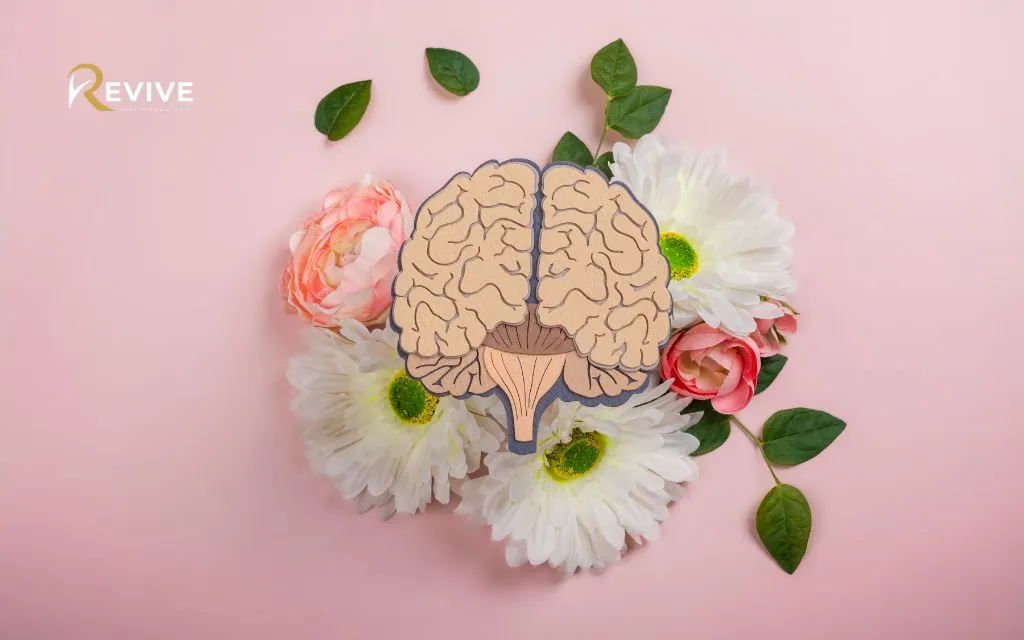Setting mental health goals is an essential step in improving emotional well-being and overall quality of life. These goals provide direction, motivation, and a structured way to build resilience against stress, anxiety, and other challenges. At Revive Health Recovery, we recognize the importance of creating achievable mental health goals that support long-term emotional balance and mental wellness.
At Revive Health Recovery, we believe that mental health is a crucial part of public health topics that affect individuals and communities. By setting clear and realistic mental health goals, individuals can work toward improved emotional strength, better coping mechanisms, and a more fulfilling life. Whether you’re looking for professional support or self-care strategies, achieving mental health goals is possible with the right approach and resources.
Learn about Mental Health Goals and Their Importance in Colorado
What Are Mental Health Goals?
Mental health goals are specific, actionable steps that help individuals improve their emotional and psychological well-being. They provide direction and motivation to work toward a healthier mind. Setting clear mental health goals is essential for managing stress, anxiety, and other emotional challenges.
In Colorado, where outdoor lifestyles and wellness-focused communities thrive, mental health goals can be particularly effective. Whether it’s improving mindfulness, reducing anxiety, or enhancing self-care, defining these goals gives people a roadmap to achieve balance and resilience.

Defining Mental Health Goals and Their Role in Emotional Wellness
Mental health goals serve as a foundation for emotional stability and overall wellness. By identifying and working toward these objectives, individuals can develop healthier coping mechanisms, improve relationships, and create a sense of purpose.
For example, some common mental health goals include practicing daily gratitude, engaging in self-care activities, or developing positive thought patterns. These actions contribute to a well-rounded emotional wellness goal that enhances mental clarity and life satisfaction.
The Connection Between Mental Health and Overall Well-Being
Mental health is deeply connected to physical health, relationships, and productivity. When mental health goals are prioritized, individuals experience improved focus, better sleep, and enhanced emotional control.
For residents in Denver and across Colorado, goal setting and mental health strategies can be supported by outdoor activities, therapy, or wellness retreats. Small daily efforts, like setting boundaries, practicing deep breathing, or maintaining social connections, contribute to long-term stability and happiness.
Why Goal Setting Matters for Mental Health?
How Setting Mental Goals Improves Emotional Stability
Setting mental goals provides clarity and motivation, which are crucial for maintaining emotional stability. Instead of feeling overwhelmed by stress or uncertainty, individuals can break down challenges into manageable steps.
For instance, if someone struggles with anxiety, a mental goal could be practicing mindfulness for five minutes a day. Over time, this small habit builds resilience and creates lasting emotional well-being.
The Science Behind Goal Setting and Mental Health
Research shows that goal setting enhances motivation and increases self-confidence. The SMART goal framework—Specific, Measurable, Achievable, Relevant, and Time-bound—is especially effective in mental health improvement.
For example, instead of setting a vague goal like “reduce stress,” a SMART goal would be “practice meditation for 10 minutes every morning for the next 30 days.” This approach ensures clarity, making it easier to track progress and stay committed.
Types of Mental Health Goals and How to Set Them
Short-Term vs. Long-Term Mental Health Goals
Mental health goals can be short-term or long-term, depending on the desired outcome.
- Short-Term Goals: Small, immediate actions like journaling daily, reducing screen time, or practicing gratitude.
- Long-Term Goals: Focus on deeper changes, such as improving self-esteem, healing from trauma, or maintaining regular therapy.
In Denver, long-term goals may involve working with therapists or joining wellness communities for ongoing support.
Balancing Achievable Goals with Long-Term Aspirations
Success in mental health goal setting requires a balance between daily efforts and long-term growth. For example, someone building emotional resilience can start with mindfulness practices and gradually work toward deeper emotional healing with therapy. Celebrating small wins helps sustain motivation and progress.
SMART Goals for Mental Health
SMART goals provide a clear, structured path to mental wellness:
- Specific: Define the goal (e.g., “Reduce anxiety through breathing exercises”).
- Measurable: Track progress (e.g., “Practice deep breathing for 10 minutes daily”).
- Achievable: Set realistic expectations (e.g., “Start with 5 minutes and increase gradually”).
- Relevant: Align with personal needs (e.g., “Deep breathing helps manage stress”).
- Time-bound: Establish a timeframe (e.g., “Do this for 30 days”).

Emotional Wellness and Self-Care Practices
- Mindfulness Meditation: Enhances presence and reduces anxiety.
- Journaling: Encourages self-reflection and emotional clarity.
- Physical Activity: Boosts mood through endorphin release.
- Social Connection: Strengthens emotional support systems.
- Therapy & Support Groups: Provides professional guidance for coping strategies.
In Colorado, engaging in outdoor activities, wellness retreats, and support groups can further enhance emotional resilience and self-awareness.
The 10 Best Steps to Make Mental Health Goals for Emotional Wellness
Setting mental health goals is a powerful way to enhance emotional well-being, reduce stress, and create a more balanced life. Just as we set goals for our physical health or careers, prioritizing mental wellness can lead to long-term benefits. Below are ten practical steps to help you develop strong emotional resilience, cultivate self-awareness, and take control of your mental well-being.
Step 1: Identify What You Want to Improve
The first step in achieving mental health goals is self-reflection. Ask yourself:
- What aspects of my emotional well-being need attention?
- Do you want to manage stress better, improve relationships, or boost self-esteem?
Identifying these areas will give you a clear starting point. Be honest with yourself about what you need to work on, and remember that mental health improvement is a gradual process.
Step 2: Set SMART Mental Health Goals
Once you’ve identified areas for improvement, create SMART (Specific, Measurable, Achievable, Relevant, and Time-bound) goals. Instead of setting a vague goal like “I want to feel less anxious” make it specific: “I will practice deep breathing exercises for 10 minutes every morning for the next month.” SMART goals make your progress trackable and help you stay committed.
Step 3: Break Goals Into Small, Manageable Steps
Large goals can feel overwhelming, so breaking them into smaller tasks makes them more achievable. If your goal is to reduce stress, you might start with simple steps like taking short breaks during work, practicing mindfulness, or setting boundaries with people who drain your energy. Small changes, when practiced consistently, lead to significant improvements over time.
Step 4: Establish a Daily Routine That Supports Mental Wellness
A structured daily routine can help reinforce positive mental health habits. Prioritize sleep, nutrition, physical activity, and self-care. Incorporating small actions like journaling, morning affirmations, or engaging in creative hobbies can help stabilize your emotions and create a sense of balance.
Step 5: Monitor Your Progress and Adjust When Necessary
Tracking your mental health goals keeps you accountable and allows you to see progress over time. Keep a journal or use an app to note how you feel each day and any changes in your mood. If something isn’t working, don’t be discouraged—adjust your strategy to better fit your needs.

Step 6: Develop Healthy Coping Mechanisms
Stress and setbacks are inevitable, but having healthy coping strategies in place can prevent overwhelming emotions. Practices such as deep breathing, meditation, physical activity, and talking to a trusted friend or therapist can help regulate emotions. Avoiding unhealthy coping mechanisms, such as substance use, is crucial for long-term emotional wellness.
Step 7: Build a Strong Support System
Surrounding yourself with positive and supportive people can make a significant difference in achieving mental health goals. Whether it’s family, friends, a support group, or a therapist, having people to lean on during difficult times fosters resilience and emotional strength.
Step 8: Prioritize Self-Care and Emotional Well-Being
Taking care of your emotional health should be a top priority. Regular self-care, whether it’s taking a walk in nature, engaging in hobbies, or practicing mindfulness, helps maintain mental well-being. Recognize when you need a break and allow yourself moments of rest without guilt.
Step 9: Seek Professional Help When Needed
If you’re struggling to meet your mental health goals on your own, seeking professional help is a proactive and courageous step. Therapists, counselors, or mental health professionals can provide guidance, support, and structured treatment plans to help you overcome challenges effectively.
Step 10: Celebrate Your Progress and Keep Moving Forward
Every step forward in your mental health journey is an achievement. Celebrate small victories, whether it’s managing stress better, improving relationships, or gaining confidence in yourself. Acknowledge your progress and stay motivated to continue your journey toward emotional wellness.
How to Achieve Mental Health Goals in Denver, Colorado
Achieving mental health goals requires the right support, treatment, and community resources. In Denver, Colorado, individuals have access to professional mental health services, evidence-based therapies, and local networks that aid their wellness journey.
When to Seek Professional Help
While setting mental health goals is empowering, professional support may be necessary when:
- Anxiety, depression, or stress disrupt daily life.
- Emotional struggles become overwhelming.
- Relationships and work suffer due to mental health challenges.
- Coping strategies no longer seem effective.
Types of Mental Health Professionals in Denver
- Therapists & Counselors: Provide talk therapy, including Cognitive Behavioral Therapy (CBT), to promote emotional stability.
- Psychologists: Diagnose mental health conditions and offer therapy but do not prescribe medication.
- Psychiatrists: Medical doctors who diagnose and prescribe medication for depression, anxiety, and mood disorders.
- Social Workers & Case Managers: Connect individuals with mental health resources and support services.
Effective Therapies for Mental Health Goals
- Cognitive Behavioral Therapy (CBT): Helps reframe negative thoughts and develop coping skills.
- Mindfulness-Based Therapy: Uses meditation and breathing exercises to reduce stress and promote emotional balance.
- Medication Management: Ensures proper treatment for depression, anxiety, and bipolar disorder through psychiatric evaluation and ongoing adjustments.
Community Support & Affordable Resources in Denver
- Support Groups: Peer-led spaces for managing depression and anxiety.
- Community Centers: Offer access to therapists, wellness workshops, and free mental health resources.
- Wellness Programs: Yoga, meditation, and fitness activities supporting emotional well-being.
- Affordable Therapy Options: Available through local non-profits, university counseling programs, and state-funded services.
By utilizing Denver’s extensive mental health resources, individuals can effectively work toward their mental health goals and achieve lasting emotional wellness.
Why Choose Revive Health Recovery for Your Mental Health Goals?
When it comes to achieving mental health goals, choosing the right facility can make all the difference. In Denver, Revive Health Recovery offers a compassionate, structured approach to mental health treatment, ensuring individuals receive the support they need to thrive.
Comprehensive Treatment Plans Tailored for You
How Revive Health Recovery Personalizes Treatment for Individuals
At Revive Health Recovery, treatment is never one-size-fits-all. The facility offers customized care plans tailored to each person’s unique mental health needs, ensuring that individuals:
- Work toward personalized emotional wellness goals.
- Receive specialized therapy suited to their condition.
- Have access to integrated treatment that combines multiple therapeutic approaches.

Evidence-Based Therapies and Holistic Approaches Combined
Revive Health Recovery combines the best of traditional and holistic therapies, including:
- Cognitive Behavioral Therapy (CBT) for structured goal setting and behavior change.
- Mindfulness-Based Therapy to improve self-awareness and stress management.
- Alternative Healing Methods, such as yoga, art therapy, and meditation, to support emotional wellness.
This multi-faceted approach helps individuals achieve both short-term and long-term mental health objectives.
Insurance, Cost, and Accessibility in Denver
What Insurance Covers Mental Health Treatments?
Many insurance providers cover mental health services, including therapy, medication, and wellness programs. Revive Health Recovery works with various insurance plans to make treatment accessible to those who need it.
Financial Assistance and Payment Plans Available at Revive Health Recovery
For individuals concerned about the cost of treatment, Revive Health Recovery offers:
- Flexible payment plans.
- Financial assistance options.
- Guidance on insurance coverage and benefits.
This ensures that financial constraints do not prevent individuals from accessing the mental health care they deserve.
Contact Revive Health Recovery Today for Professional Help
Location: Denver, Colorado – Easy Access for Residents
Revive Health Recovery is centrally located in Denver, making it a convenient choice for those seeking mental health support.
Call-to-Action: Schedule a Free Consultation and Take the First Step Toward Emotional Wellness
If you’re ready to take control of your mental health goals, Revive Health Recovery is here to help. Contact them today to schedule a consultation and start your journey toward better mental well-being.
Don’t wait to prioritize your mental well-being—reach out today and take the first step toward lasting emotional wellness. Call (303) 268-4655 or email contact@revivehealthrecovery.com to schedule your consultation and start your path to a healthier, happier life.
Conclusion
Public health topics are essential in shaping healthier lives, and mental wellness should always be a priority. Setting mental health goals and seeking professional care when needed can significantly improve overall well-being. Revive Health Recovery is dedicated to providing expert support, evidence-based therapies, and a compassionate approach to mental health care. If you’re ready to take charge of your emotional well-being, reach out to our team today and take the first step toward a balanced, healthier life.



